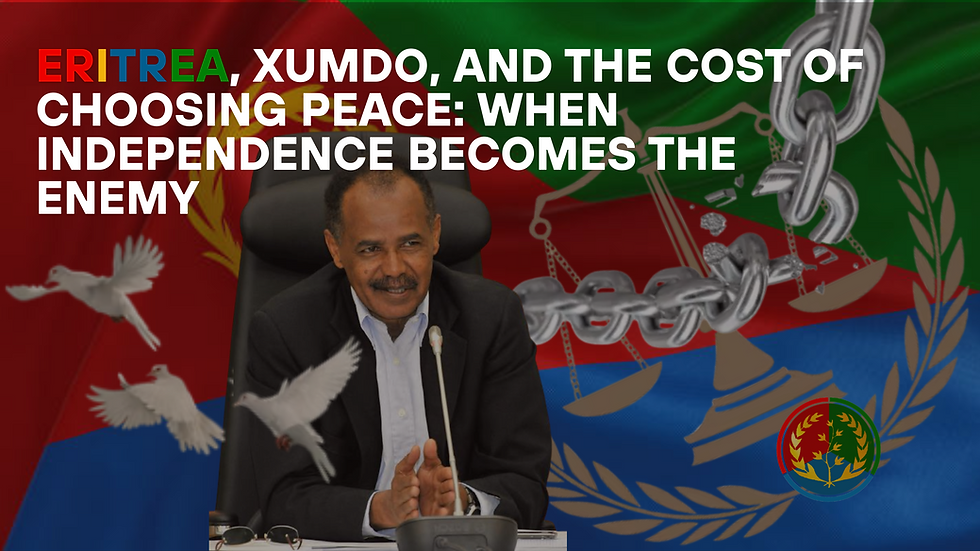The Big Bad Wolf is Crying Now: The IMF’s Crocodile Tears After Decades of African Subjugation
- Nakfa Eritrea
- Apr 20, 2025
- 3 min read
They told us the IMF was a helping hand—an international safety net to protect poor nations from collapse. But for many Africans, the IMF has never been a lifeline. It has been a leash. And now, as the world shifts away from Western hegemony and new alliances rise across Africa, Asia, and Latin America, the very same IMF is warning of “instability,” “economic shocks,” and “geopolitical risk.”
How ironic.
The Big Bad Wolf is crying now—after blowing down our homes, gutting our industries, and handing our future to creditors.
A Debt Trap Dressed as Aid
When Ghana gained independence in 1957, Africa stood on the edge of promise. Leaders like Kwame Nkrumah envisioned a continent united by self-reliance, development, and dignity. But by the 1980s, most African nations had become deeply entangled in IMF loans.
Those loans came with chains.
To get "help," African nations had to accept Structural Adjustment Programs (SAPs)—economic policies dictated by the IMF and World Bank that forced countries to:
Cut healthcare and education budgets
Privatize state-owned companies
Remove trade protections
Devalue local currencies
In reality, this meant the dismantling of food self-sufficiency, public hospitals, and local industries. Nations like Zambia, Côte d’Ivoire, and Nigeria were told they had to earn their own poverty by selling everything they owned just to qualify for more debt.
How the IMF Kept Africa in Chains
Let’s call it what it is: economic warfare.
The IMF created a system where African countries were always in debt but never in control. Once inside the trap, you were too broke to leave. To repay loans, nations had to export raw materials—cheaply—while importing finished goods at inflated costs.
They pushed policies that:
Flooded markets with foreign products, bankrupting local farmers and artisans
Gave foreign investors tax holidays while taxing the poor at home
Forced the selling of vital infrastructure (water, railways, ports) to multinationals
Even education systems were gutted. Why? Because an informed generation would question why its leaders were taking orders from Washington and Brussels instead of their own people.
In 1986, Tanzania was told to cut spending on rural healthcare. That same year, IMF staffers in Europe approved millions in bonuses. The arrogance wasn’t hidden—it was printed in every spreadsheet.
The Empire Cracks and the IMF Panics
Today, the tables are turning.
African countries are beginning to break free of Western control, forming new alliances with BRICS, exploring local currencies, and rejecting IMF terms. Eritrea walked away from IMF loans entirely. Burkina Faso just kicked out French troops and is refusing neocolonial economic policies. Mali and Guinea are following suit.
And what does the IMF do? Cry wolf.
Now they warn that “geopolitical instability” could disrupt markets. That “rising nationalism” (read: self-determination) could cause investor panic. That rejecting the dollar might lead to economic collapse.
But let’s be clear: they’re not crying for Africa. They’re crying for Western banks, multinational corporations, and elites who no longer control Africa's gold, oil, or people like they used to.
The IMF sees the empire cracking—and they want us to believe we’ll be safer if we crawl back into the same cage.
We See You, Wolf. And We’re Not Afraid.
The IMF is panicking because their lies no longer hold power. Africans are waking up. Young leaders, community organizers, and digital warriors are calling out the façade of “aid” and demanding real sovereignty.
We remember how they:
Backed dictators if they followed IMF rules
Punished democracies that chose socialism or self-reliance
Destroyed our agriculture and called it “modernization”
Said water and electricity were luxuries, not rights
So no—we don’t believe your warnings about instability. We know your real fear is a free Africa, too proud to beg, too strong to bribe, and too united to divide.
This time, the Big Bad Wolf’s cries won’t bring panic. They’ll bring resistance.
Because we remember. We’ve survived. And now, we are rebuilding—on our terms.
.png)



Comments